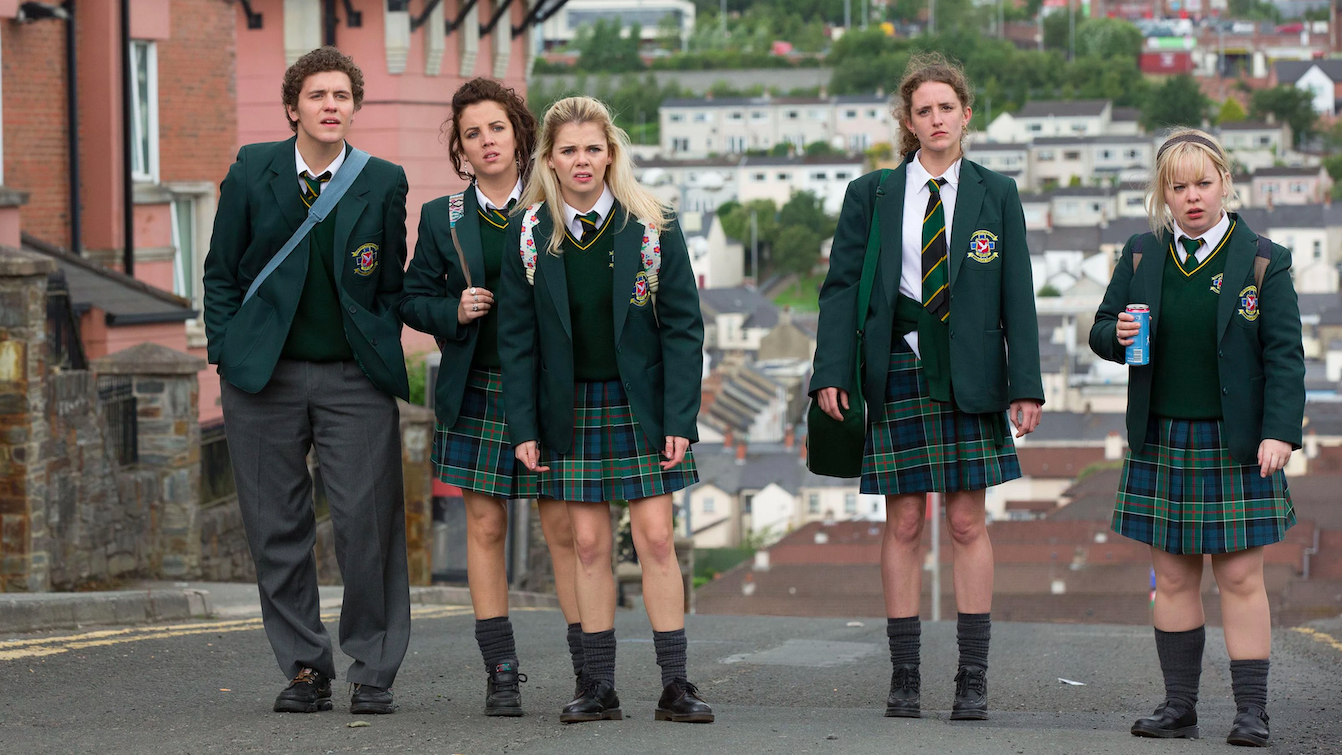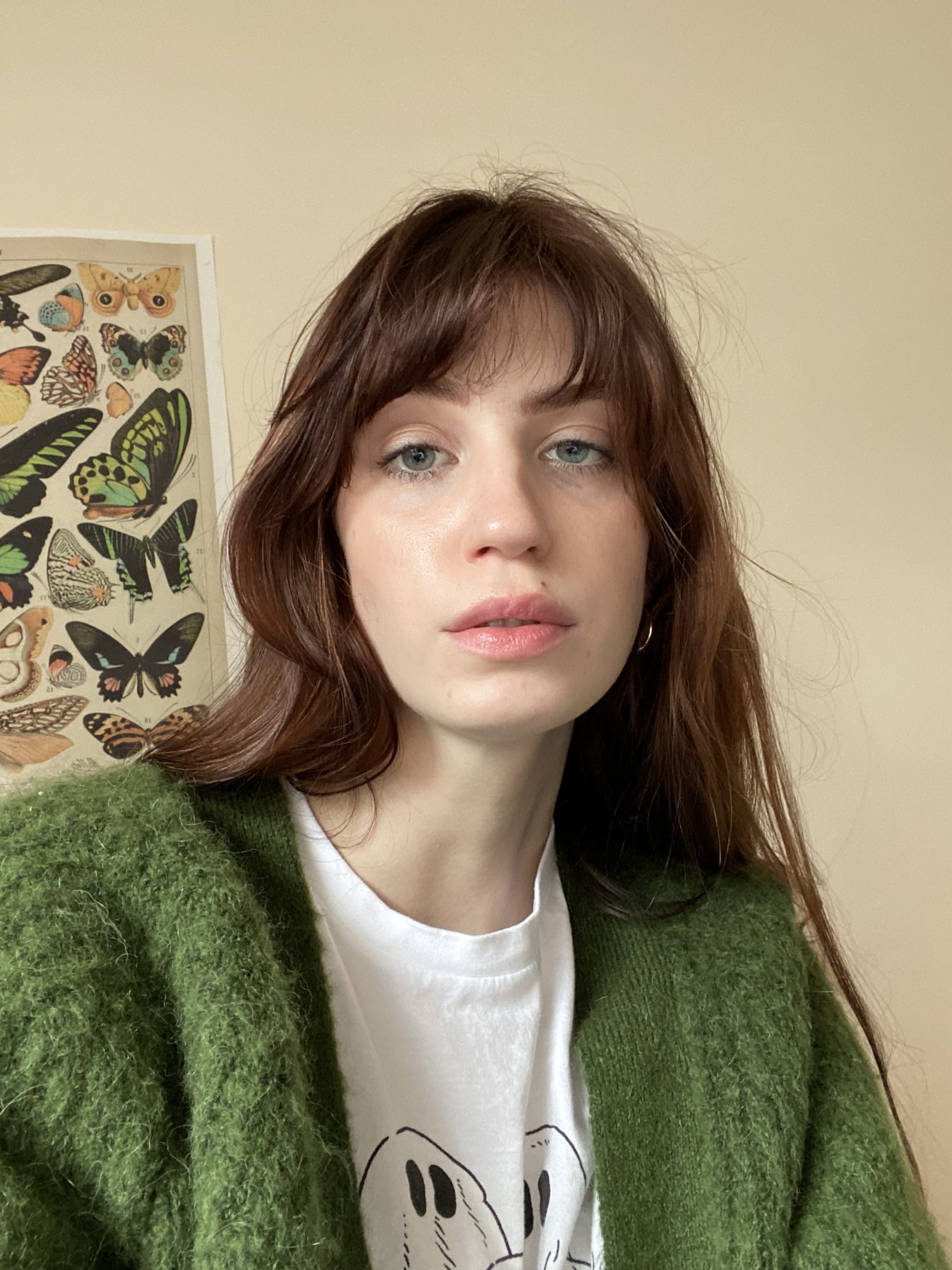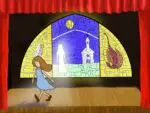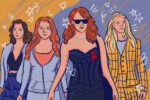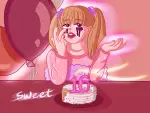The pilot episode blasts open with the recognizably ’90s ballad “Dreams” by The Cranberries and a view of rolling green hills that promise to take your breath away. The only thing that could make the opening scene of “Derry Girls” better is the voiceover of a very personal diary entry not belonging to the narrator. Erin Quinn, the arrogant idealist and main protagonist of the show, has had her most personal thoughts stolen by her eccentric cousin, Orla McCool. Taking these stolen thoughts, McCool turns them into a book report.
Perhaps, for these girls and their bizarre group of friends at Our Lady Immaculate Catholic school, these absurd experiences are simply a byproduct of trying to find excitement while living in such a bleak time. Together they set a fast-food restaurant on fire, lie about a statue of Mary weeping, and even hitchhike to a Take That concert. But, regardless of motive, the humiliating sense of humor paired with uniquely strong characterization are only a few of the hallmarks that hold strong throughout the series.
Ultimately, the show faces the challenge of breaking down barricades and bringing forth a new era of authentic teen coming-of-age stories. The experience of being a teenager isn’t meant to be a glamorous one, unlike what is depicted by most popular media. Instead of focusing on the real experiences of young adults everywhere, laden with unpredictable hormones and awkwardness, TV illustrates this tumultuous time of life as something that’s flawless and exciting — without a clogged pore in sight.
A prime example of this comes with the show “Euphoria,” which claims to offer a realistic depiction of teenage life in modern America. Themes such as peer pressure, sex, drugs and the repercussions of social media are at the forefront, fostering important conversations. But the bigger problem is that they don’t seem to end. Many of the characters in the show are never seen wearing a backpack — or underwear. While excessive nudity and plotlines that revolve heavily around sex and drugs are some of the qualities that set “Euphoria” apart from other teen shows, it’s important to consider whether such scenes are what a supposedly “normal” teenager’s existence looks like. And what are the long-lasting effects on its target audience? In a world that’s stuffed itself full with media, where do the lines between reality and fiction blur?
But this leads to the bigger problem with this show’s genre, which isn’t necessarily the content. Teenagers will gravitate toward media that subverts the norm and rebels against expectations. That is a necessary part of growing up. But that’s where the larger issue arises — where are the other parts? The life-ending emergence of a zit or sweaty hands at an awkward school dance are teenage cliches that have been replaced with plots about social media and aesthetics based on airbrushed makeup and acute product placement. And, yes, while these might be the new realities of adolescence in a late-capitalist world, is that what it should really feel like to grow up?
The answer to that is no. In reality, many of the actors in these shows have already experienced all of these growing pains because it’s common for Hollywood to recruit 20-somethings to play teenagers in movies and TV. But it doesn’t make it right. In “Riverdale,” Lili Reinhart, who plays Betty Cooper, is 25 years old. Lea Michele was 22 when she starred in “Glee.” This might be why many teenagers are looking for experiences that are out of their age range because they’re really watching adults on screen. These onscreen pseudo-teens don’t face nearly as many labor regulations on set, even if they are doing things meant for children.
However, even when age-appropriate casts do depict a more accurate teenage experience, like “Stranger Things” or “High School Musical: The Musical: The Series,” the disconnect between the actors and their characters is still significant. Both Olivia Rodrigo and Millie Bobby Brown, the stars of these shows who are still in their teens, act and dress in a way that is much more mature than their age. Rodrigo’s ex-boyfriend, Adam Faze, was 24 when they started dating, and Brown had been caught up in concerns that she was being sexually groomed by rapper Drake. However, this trend of young actresses being looked at in a sexually mature light when they turn 18 isn’t new, nor is it healthy.
This is why “Derry Girls” holds a larger appeal. The characters of the show are presented in a way that reflects the pure embarrassment of growing up. And, instead of turning away from the cringe of it all, they embrace it. They have lipstick-stained posters of boy bands on their walls and crookedly apply eyeliner. They seemingly don’t care that they don’t know how to talk to boys, or that they don’t know everything about the world yet. Instead, Erin and her friends walk the halls of their staunchly conservative school with a flair that can only be accompanied by cheesy slow-motion camera effects and the confidence that they’re the ones doing everything right, even if it’s getting into trouble.
“Derry Girls” doesn’t shy away from the fact that growing up is oppressive and unfair. It highlights how important it is to find friendships that are real. This effect is partially achieved by the lack of technology in the war-ridden Northern Ireland of the ’90s, or just the surplus of mom jeans before they became another trend. To survive growing up through these difficult times, one must find their own kind of fun and not care what other people think. “Derry Girls” does this perfectly by telling the audience that, even when the world has gone to “utter shite,” maybe just do a badly choreographed step-aerobics dance routine in front of the whole school or kidnap a religious artifact. And maybe it’s okay to be a kid and have fun.


